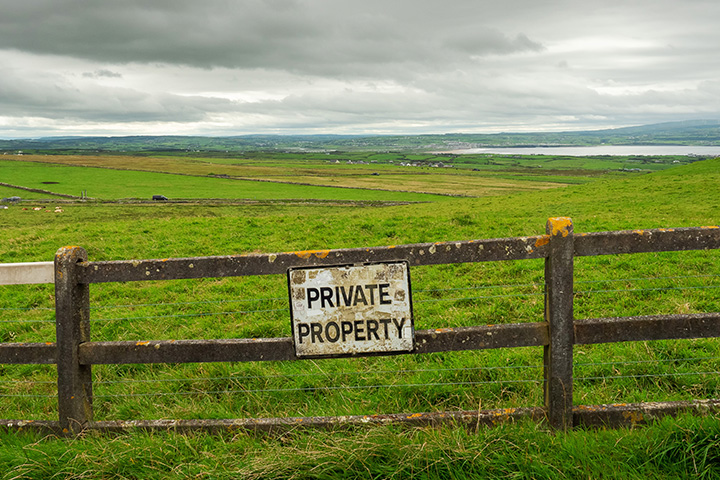Adverse possession is a legal principle whereby someone can claim ownership and have land registered to themselves at Land Registry on the basis of occupying the land for a certain period of time.
Adverse possession is sometimes referred to as “squatters’ rights”, but it applies in a range of situations beyond abandoned buildings. It can arise where boundaries are disputed, land has been enclosed or maintained without permission, or where the legal owner has not used or monitored the land for many years. The law is designed to balance the rights of property owners with those who have made long-term, exclusive use of land.
How do I make an Adverse Possession claim?
A claim for adverse possession is made by submitting an application to Land Registry in the format of an ADV1 form, along with a sworn declaration setting out the history and details of the use of the land in question, along with any other available evidence to support the application.
If Land Registry are satisfied their requirements are met, they will then serve notice of the pending application on the owner of the land to make them aware of the intended registration. If the Land is unregistered, Land Registry will serve notice on anyone who may have a potential interest in the land i.e. potential owners and neighbouring properties.
The registered owner or interested party will have a period of 65 days from receipt of the notice to respond. The options for the registered owner are as follows:
- Object to the application – If the owner or an interested party objects to the application then the Land Registry will notify the applicant and the matter can be referred to the Land Registry Dispute Resolution Process to attempt to resolve the conflict.
- Serve a Counter Notice – The owner or interested party can serve a Counter Notice which prevents the Land Registry from completing the registration without further investigation. If a Counter Notice is served, the applicant has to attempt to prove they meet the requirements for the application to be accepted.
- Do nothing/accept the application – If the 65 days pass and no correspondence has been received from the land owner, or they acknowledge and confirm they have no objections to the application then Land Registry will accept the application and register the land to the applicant with Possessory Title.

What is a Possessory Title?
A Possessory Title is a lesser class of Title whereby the owner does not have full legal proof of ownership of the land and there may be ambiguity over the ownership. Once a period of 12 years has passed, Land Registry will be willing to upgrade to Absolute Title which gives unequivocal rights of ownership.
What are the requirements for an Adverse Possession claim?
In order to be able to make a successful claim the applicant must be able to illustrate the following within their application:
- Factual Possession of the land – The applicant must be able to show they have treated the land as their own and have had control of the same e.g. enclosing the land with fencing.
- The intention to possess – The applicant must show more just the factual possession, but also their intention in possessing the land as their own and to exclude the legal owner e.g. making improvements and maintaining the land.
- Adverse possession – The applicant must be able to show that the possession has been without the legal owners consent i.e. there have been no discussions or agreement as to the use and that there are no permissions in place to do so.
What is the time period required to make an Adverse Possession claim?
- If the land is registered, the applicant must be able to provide evidence of 10 years of use.
- If the land is unregistered, the applicant must be able to provide evidence of 12 years of use.
- The period of use must have been continuous and uninterrupted.
Contact our specialist residential conveyancing team in Yorkshire
If you think you may have a potential claim for adverse possession or require further advice in relation to adverse possession then our specialist residential conveyancing team will be able to assist. Find out more about how we can help you by calling any of our offices to arrange an appointment.
Speak to our expert residential conveyancing solicitors in Wakefield, Ossett, Garforth, and Sherburn in Elmet, Yorkshire today by calling 01924 290 029 or ask a question using our online enquiry form.




The content of this blog post is for information only and does not constitute formal legal advice and should not be relied upon as advice. Thornton Jones Solicitors Limited accepts no liability for any such reliance upon this content. Where the post includes links to external websites, Thornton Jones Solicitors Limited accepts no responsibility for the content of such sites. Any link to a third-party website should not be construed as endorsement by Thornton Jones Solicitors Limited of any content, products or services which are outside our direct control.
Adverse possession, sometimes called squatters’ rights, is when someone occupies land without the owner’s permission and may gain legal ownership after meeting strict legal requirements.
In England and Wales, you usually need 10 years of continuous possession for registered land, or 12 years for unregistered land, to apply for ownership.
Yes. The landowner can object or serve a counter notice within 65 business days of being notified by Land Registry, which can block or delay the claim.
Fencing is strong evidence of factual possession, but maintaining, cultivating, or otherwise excluding others from the land can also support a claim.
If successful, you’ll usually be registered with Possessory Title. This can be upgraded to Absolute Title after 12 years if there are no legal disputes.







